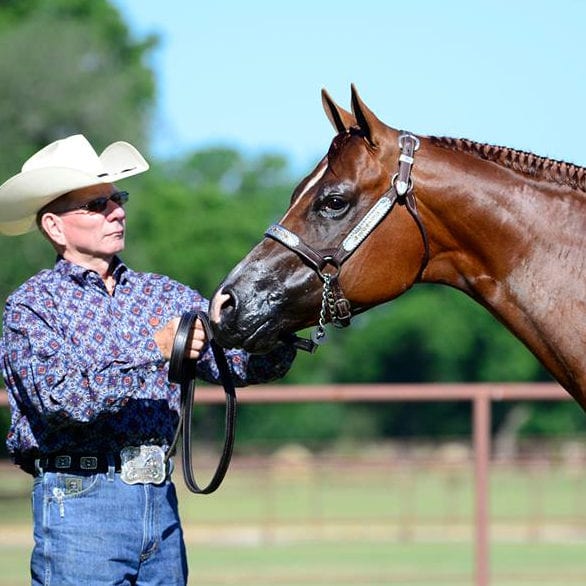Standing on the rail at a horse show, watching the top exhibitors, horses, and judges do their best work, one can learn a lot about success in the industry. In fact, watching carefully and asking questions is a standard piece of advice the best of the best give to those just beginning or looking to better themselves.
But where do those at the top, the ones leading the industry and setting trends in the show pen, look to better themselves or increase their edge?
GoHorseShow asked four of the industry’s leaders exactly that. Their answers? Watch carefully. Read voraciously. Surround yourself with great people. Study hard. And, like them, do it all with unmatched dedication.
“Watch carefully,” says Ted Turner
Looking back on the evolution of the horse show world, the best way to learn and grow decades ago was sharing ideas and asking questions of the horsemen standing outside the pen watching or the ones coming out of the pen winners. But as times have changed, so have the strategies used to increase the knowledge base and sharpen skills. That’s not to say exhibitors should abandon their best rail-side seats. In fact, they better get comfortable. Watching carefully is the tried and true strategy of halter trainer Ted Turner, who holds more world championship titles than anyone in history.
 “I’m a watcher. Every time I go somewhere, I take what I’m seeing and apply it to what I know to make my program better. I’m always trying to improve what I do. Watching – that’s basically how I’ve learned what I know about horses,” says Turner, who notes he never worked for anyone else in the industry. “I’ve always done it myself. You can always learn by watching. Just take it all in.”
“I’m a watcher. Every time I go somewhere, I take what I’m seeing and apply it to what I know to make my program better. I’m always trying to improve what I do. Watching – that’s basically how I’ve learned what I know about horses,” says Turner, who notes he never worked for anyone else in the industry. “I’ve always done it myself. You can always learn by watching. Just take it all in.”
Turner’s next piece of advice? Know your goals and be dedicated to doing what is required to reach them. “Know what you want. Study those who are good at what you want to be. Apply your ideas right and left to it. But the main thing is, you’ve got to be dedicated. Try to do everything real consistently and be dedicated to what you’re doing.”
Finally, be focused. He explains that few trainers today excel in multiple disciplines. Instead, they specialize in one focused area. “When I first started years and years ago, I rode pleasure and showed halter horses. I had a hard time winning at both. I made a decision just to show halter horses and try to be the best I can be at that. In today’s industry, there are guys who do all-around, but for the most part, people specialize,” Turner says. “I’m very dedicated. We do the same thing every day…every single day. Other than family, horses come first. That’s just the way it is.”
“Read voraciously,” advises Nancy Sue Ryan
 When she’s not aboard a horse, you might be surprised to find Nancy Sue Ryan, who has ridden more hunt seat champions than she can count, with her nose buried in a book; but that’s one way she keeps her edge – by reading whatever she can get her hands on.
When she’s not aboard a horse, you might be surprised to find Nancy Sue Ryan, who has ridden more hunt seat champions than she can count, with her nose buried in a book; but that’s one way she keeps her edge – by reading whatever she can get her hands on.
“I’m an avid reader about anything to do with horses; about health, about new medicines. Anything I can learn, I study. I like to read about people who are successful, and it doesn’t matter the industry they’re in. I like to find out what’s in people’s heads that make them achievers,” Ryan says, noting that she’s always picking up random literature, no matter the topic, and trying to better herself through it. “If you take one thing from an article and make it work for you, it’s a great thing.” Additionally, she does a lot of studying horses and riders and says she learns a lot by talking to vets and others in the industry.
 As two of the top trainers under the constant eye of those aspiring to improve, Ryan and Turner’s success influences how others train and show their horses. Ryan advises treating each horse as an individual and as a unique opportunity to learn. Ryan never had a trainer as a youth. Her trainer has been the many horses she’s ridden, hundreds of which she trained to become champions.
As two of the top trainers under the constant eye of those aspiring to improve, Ryan and Turner’s success influences how others train and show their horses. Ryan advises treating each horse as an individual and as a unique opportunity to learn. Ryan never had a trainer as a youth. Her trainer has been the many horses she’s ridden, hundreds of which she trained to become champions.
“I believe that each horse has to be treated as an individual; what works for three horses over here may not work for the next two you step on. Instead of making those two that it’s not working for adjusting to you, you have to adapt to them,” Ryan says. “We have to quit trying to make square pegs fit into a round hole.”
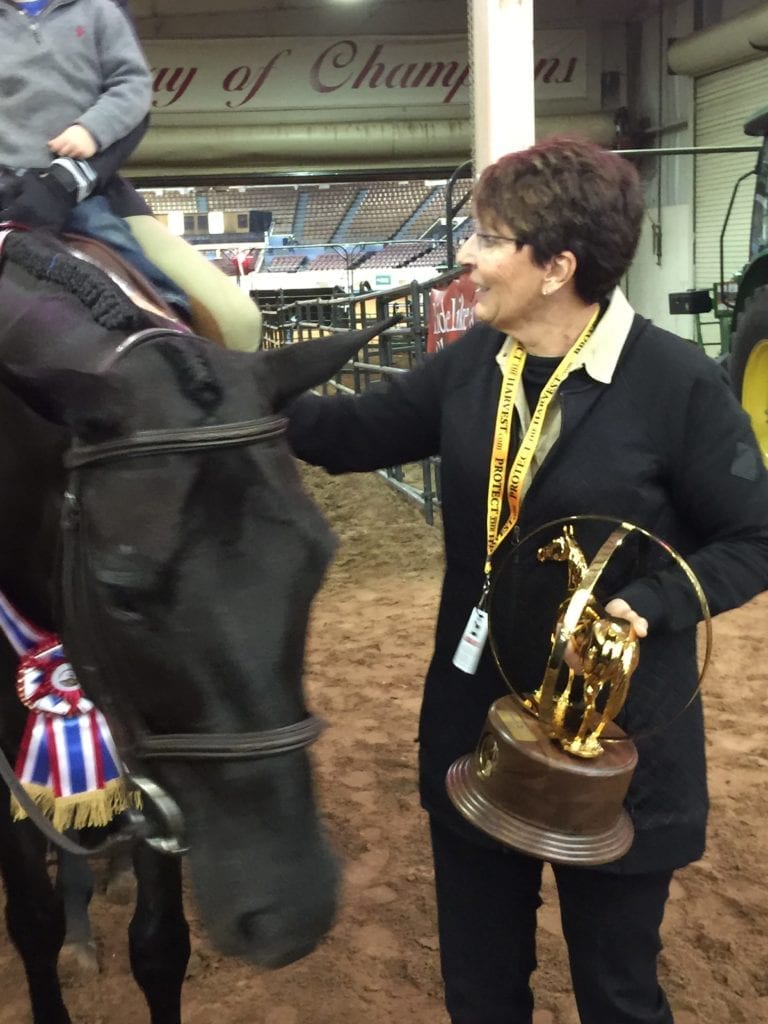 Part of Ryan’s success can be attributed to her desire to get in her horses’ minds. She laughs as she recalls one little mare who would bolt each time Ryan climbed on. Ryan would bring the mare down in a circle and help her relax ride after ride. But rather than hanging it up in frustration, Ryan sees horses like that as an opportunity to better your game. “The harder the horse was, the more I liked them. I was always just wondering, ‘What makes you tick? What’s caused you to be this way? What’s happened in your life?’ and I’ve had to adapt. That little mare taught me as much as any other.”
Part of Ryan’s success can be attributed to her desire to get in her horses’ minds. She laughs as she recalls one little mare who would bolt each time Ryan climbed on. Ryan would bring the mare down in a circle and help her relax ride after ride. But rather than hanging it up in frustration, Ryan sees horses like that as an opportunity to better your game. “The harder the horse was, the more I liked them. I was always just wondering, ‘What makes you tick? What’s caused you to be this way? What’s happened in your life?’ and I’ve had to adapt. That little mare taught me as much as any other.”
Watching others, reading, and learning from the horses you have the opportunity to work with have proven successful for these two top trainers. But what about the individuals in the center of the ring at the horse show – the ones placing the class? Where do the industry’s leading judges sharpen their skills?
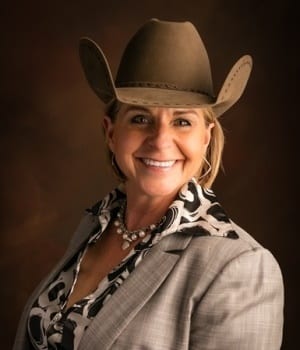 “Surround yourself with great people,” Carter recommends
“Surround yourself with great people,” Carter recommends
As AQHA’s senior director of judges, Patti Carter’s impact on judging and the horse show world is evident. Like Ryan, Carter is a bookworm, soaking up anything she can from various literature. Recently, she’s been reading about competition, sports psychology and leadership, noting that success in judging has roots in all three. Additionally, she hones her skills by collaboration with her cohorts and surrounds herself with people from whom she can continue to learn.
“In my current position, I have to keep my eye working at the top of the game because now I’m leading the judges. As they do, I have to be at the top of my game in all of the events. To do that, I’m learning from the others who are mentors for me – those in other associations who are also teaching the judges,” Carter says, noting that many people have influenced, mentored, and inspired her throughout her career, starting with her parents, who were both trainers. Her father was also a judge, and from him, she learned several judging lessons she strives to pass on to others.
“I learned the value of standing in the arena and doing your work, having courage because there is a lot of courage involved in judging, and I learned the path of least resistance is not always the easiest way to go when you’re judging.”
Like the judges who look up to her, Carter continues to attend seminars and clinics whenever she can. “Anytime you can go to a clinic and learn and get somebody else’s perspective; I think that’s always, always positive. Of course, I believe that it has to be with someone you know is reputable. Learn to recognize excellent judges and learn from them and never be afraid to ask questions. You’re only as good as the people around you, so just surround yourself with great people – that’s what you need to do,” she says.
“Study hard,” Dellin recommends
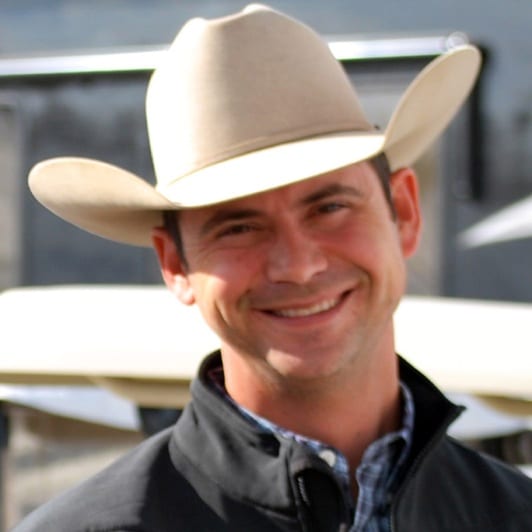 One of Carter’s counterparts is David Dellin, APHA’s Director of Judges. With a similar impact on educating judges of the stock horse world, Dellin suggests studying all things equestrian, regardless of where your passion lies. That means even if a judge specializes in halter horses and that’s really what they most like to do, Dellin would suggest moving outside the comfort zone and studying heeling, western pleasure, barrel racing or cutting – he even mentioned developing an appreciation for Hollywood horses like Trigger!
One of Carter’s counterparts is David Dellin, APHA’s Director of Judges. With a similar impact on educating judges of the stock horse world, Dellin suggests studying all things equestrian, regardless of where your passion lies. That means even if a judge specializes in halter horses and that’s really what they most like to do, Dellin would suggest moving outside the comfort zone and studying heeling, western pleasure, barrel racing or cutting – he even mentioned developing an appreciation for Hollywood horses like Trigger!
“Even if you don’t understand that world you’re watching very well, learn as much as you can about it. Learn to have a great appreciation for the performance you just watched – I don’t care what it is. It doesn’t mean you have to do it; have an appreciation for how someone accomplished that with a horse. That, to me, is the greatest key to being a good judge. It’s a real detriment if you don’t look outside your specialized world and have an appreciation for the other events,” he says.
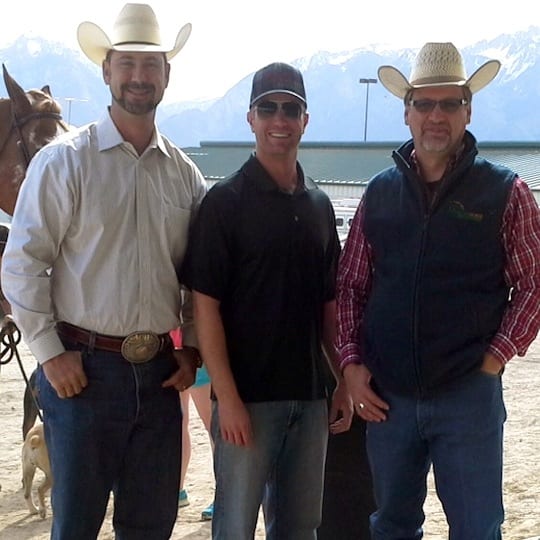 Like Carter, Dellin notes his peers as some of his best mentors and teachers. But, he also looks outside the horse industry to better himself. “I talk to other people in the industry; I look to them for different thoughts, advice, and information. Billy Smith (APHA Executive Director, pictured right) gives a lot of perspective to me on a multitude of different things. But a lot of what I’m learning now does come from outside the horse world – from business models, from different things others have tried in other areas. A lot of inspiration has to come from peer groups because the horse world is one that is unlike any other industry out there. But we can certainly learn and take pieces from outside the industry, too.”
Like Carter, Dellin notes his peers as some of his best mentors and teachers. But, he also looks outside the horse industry to better himself. “I talk to other people in the industry; I look to them for different thoughts, advice, and information. Billy Smith (APHA Executive Director, pictured right) gives a lot of perspective to me on a multitude of different things. But a lot of what I’m learning now does come from outside the horse world – from business models, from different things others have tried in other areas. A lot of inspiration has to come from peer groups because the horse world is one that is unlike any other industry out there. But we can certainly learn and take pieces from outside the industry, too.”
It was looking outside the industry that helped Dellin recognize an opportunity to enable judges and exhibitors alike with a new way to take his advice and study their craft hard – from the comfort of their own home.
“There often seems to be this mysterious black veil of secrecy about judging. What are they looking for? What do they reward? It’s not that big of a mystery. What it is is incredibly complicated and technical!” Dellin says.
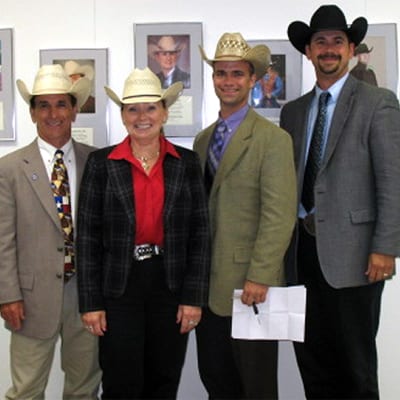 With that in mind, and by studying business models outside the horse industry to better it, Dellin and others sought a way to disseminate judges’ seminar quality information to home computers. Inspired by internet retail giants like Amazon, the team wanted to make studying up more accessible than traveling to distant judges’ seminars. Thus was born horseiq.com, an online platform that allows users to watch runs, give and submit scores, and hear commentary from expert judges on those runs and their rationale for scoring.
With that in mind, and by studying business models outside the horse industry to better it, Dellin and others sought a way to disseminate judges’ seminar quality information to home computers. Inspired by internet retail giants like Amazon, the team wanted to make studying up more accessible than traveling to distant judges’ seminars. Thus was born horseiq.com, an online platform that allows users to watch runs, give and submit scores, and hear commentary from expert judges on those runs and their rationale for scoring.
“The more educated the exhibitors are, they’re going to realize that 99% of the time, the judging was done really well. Until you have a really good understanding of what a -1 or a +1 is, placings can be hard to understand, but this gives everyone a really good basis as to what those maneuvers look like, and it should benefit the horse industry long-term.”
But perhaps the biggest benefit to the industry long-term is having leaders like Turner, Ryan, Carter and Dellin, from whom we can all learn. Their dedication to continuing their own education benefits all members of the industry, whether we access their wealth of knowledge by logging on remotely or just by watching closely from a show pen rail.
About the author: When she isn’t wrangling 12 and 13 year-olds in her middle school English classroom, Megan Ulrich enjoys riding, showing and judging horses. She lives in Holmen, Wisc., with her husband, daughter, two dogs and two horses. She earned her journalism degree from the University of Wisconsin-Madison.


